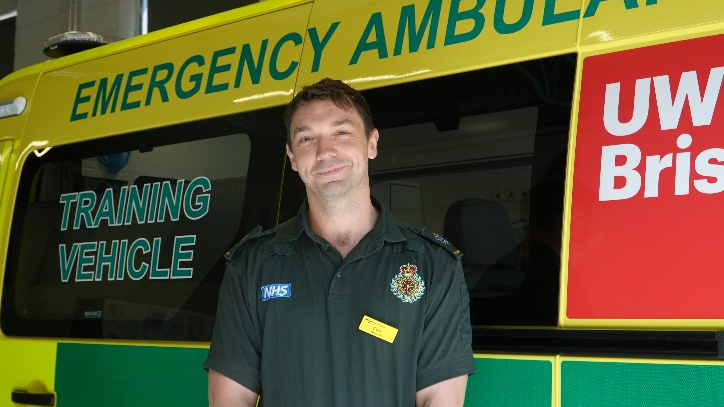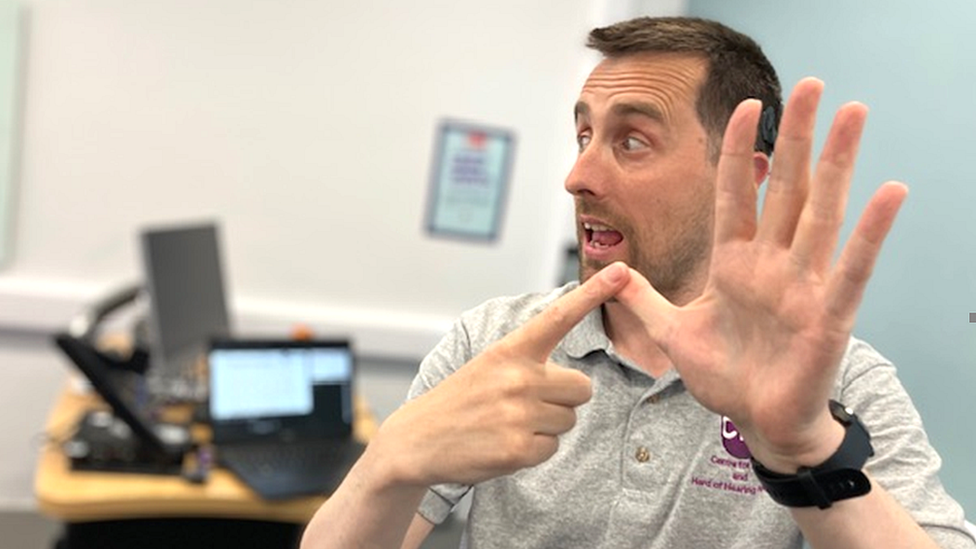Sign language 'absolutely essential' says paramedic

Daniel Hunt set up deaf awareness sessions for hundreds of students at the University of the West of England
- Published
A student paramedic who helped organise basic sign language training for hundreds of future NHS workers has said it is "absolutely essential".
Daniel Hunt, 38, from Keynsham, set up the deaf awareness sessions at the University of the West of England (UWE) in 2023, while studying for his degree. He graduated in July with first class honours.
Now a paramedic with the South Western Ambulance Service, his deaf awareness training has been integrated into the Paramedic Science degree at UWE.
Mr Hunt said: "Deaf people can contact 999 and use sign language on an app and request the emergency services, but once we arrive that service stops. So having sign language is absolutely essential."
Mr Hunt said the "sessions exploded in popularity" when they were first introduced.
"The training was delivered by deaf trainers and deaf organisations, so it was really impactful," he said.
"They're hugely popular and now [UWE has] integrated that into the paramedic curriculum and are looking to roll it out to midwifery and optometry students.
"That's amazing and that's the thing I'm most proud of."
Mr Hunt, who is not deaf or hard of hearing, said he "gave [sign language] a go" several years ago and "fell in love with the language".
But it was only after talking to friends in the deaf community about his work as a paramedic student that he realised the potentially life-threatening communication problems they faced.
"I really believe that communication is the most important skill a paramedic can have," he said.
"We're going out to people in a real time of need and in emergency situations.
"It's often a crisis for them and it makes it so much worse when we can't communicate effectively."
He said at the moment, paramedics have to rely on "writing things down and lip reading" when attending a deaf patient.
"When we attend people who speak different languages, we ring up and get an interpreter on the phone, but for sign language there's nothing in place," he said.
'Inclusive patient care'
Julian Simpson, from UWE Bristol, said Mr Hunt had made an "extraordinary impact" during his time as a student.
"Dan's work to improve deaf awareness across UWE and beyond reflects his unwavering commitment to ensuring that patients do feel seen, heard and understood," she said.
A spokesperson for the South Western Ambulance Service NHS Foundation Trust (SWASFT) said they were "really proud" of the contribution that Mr Hunt has made.
"His work, driven by a passion for inclusive patient care, has helped shine a light on the communication barriers faced by deaf and hard-of-hearing individuals in emergency medical settings," the spokesperson said.
"This development is a positive step towards more inclusive pre-hospital care and supports the trust's commitment to reducing health inequalities and improving communication with all patients."
Get in touch
Tell us which stories we should cover in Bristol
Follow BBC Bristol on Facebook, external, X, external and Instagram, external. Send your story ideas to us on email or via WhatsApp on 0800 313 4630.
- Published29 December 2023
